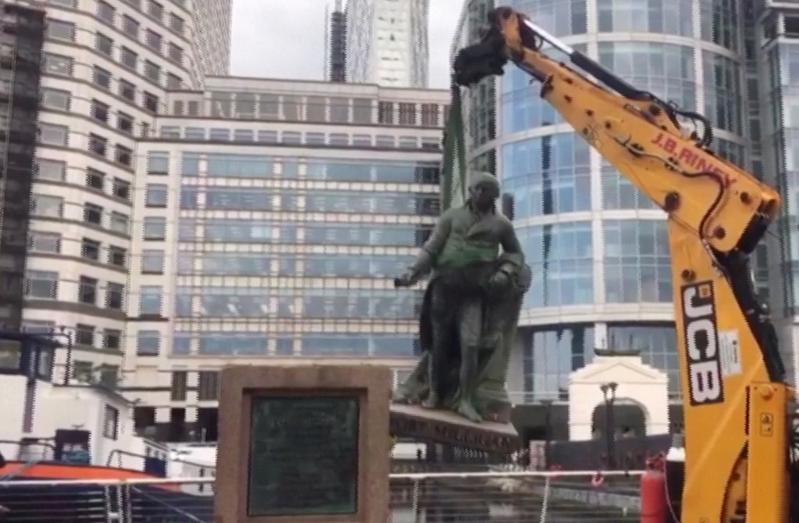 A video grab taken from a video released by Tower Hamlets council shows a statue of Scottish slaveholder Robert Milligan being removed from West India Quay, east London on June 10, 2020. (HANDOUT / TOWER HAMLETS COUNCIL / AFP)
A video grab taken from a video released by Tower Hamlets council shows a statue of Scottish slaveholder Robert Milligan being removed from West India Quay, east London on June 10, 2020. (HANDOUT / TOWER HAMLETS COUNCIL / AFP)
As the global anti-racism movement sweeps Europe, statues and street names in London with links to slavery "should be taken down", the city's mayor has said, while in Belgium a petition is growing to have all statues of King Leopold II removed.
In Belgium, activists have called for statues of the colonial-era king Leopold II, associated with the deaths of millions of Africans, to be removed
Sadiq Khan said he had set up a commission to review London's landmarks to ensure they reflect its diversity, and councils across England and Wales are to review "the appropriateness" of monuments and statues in their towns and cities.
The debate about controversial monuments or statues has flared up since the May 25 death of George Floyd while in police custody in the city of Minneapolis in the United States.
Statues of Confederate leaders who fought in defense of slavery in the US have long been a subject of controversy. In Britain, it began on Sunday when a crowd of protesters tore down a statue of slave trader Edward Colston and threw it into Bristol Harbour.
ALSO READ: Confronting a bygone era, London removes slave trader statue
On Tuesday, a statue of prominent slave trader Robert Milligan was removed from outside the Museum of London Docklands, prompting local authorities to announce a review of how such monuments should represent "the more troubling part" of the country's history.
Thousands in Oxford gathered to demand the removal of a statue of imperialist Cecil Rhodes, and in Edinburgh, a plaque is to be added to a Henry Dundas monument.
Debate over removal
The leader of Cardiff Council said he would support the removal of a statue of slave-owner Thomas Picton, while in Manchester, Councilor Luthfur Rahman has described the "weight of emotion around the symbolism attached to public statues" as "palpable".
The Museum of London Docklands said that the statue of Milligan, a Scottish slave trader and merchant who by the time of his death owned two sugar plantations and 526 slaves in Jamaica, had "stood uncomfortably" outside its east London premises for a long time.
Khan commented on the statue's removal, writing that while "it's a sad truth that much of our city and nation's wealth was derived from the slave trade-this does not have to be celebrated in our public spaces".
During a "Black Lives Matter" protest in central London on Sunday, a statue of Winston Churchill in Parliament Square was sprayed with graffiti.
But Khan said he did not consider statues of the likes of Churchill to be included in the review.
READ MORE: Protests roll on against 'worldwide' racism
He said school pupils needed to be educated about famous figures "warts and all" and that "nobody was perfect", including the likes of Churchill, Gandhi and Malcolm X.
Khan's proposed commission will "further the discussion into what legacies should be celebrated and make a series of recommendations".
In Belgium, activists have called for statues of the colonial-era king Leopold II, associated with the deaths of millions of Africans, to be removed. Pascale Smet, Brussels' heritage minister told Euronews on Tuesday that public debate on the issue should be held as quickly as possible.


